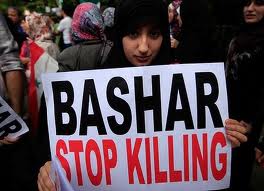 Syria’s protest movement struggled to keep the uprising peaceful and non-sectarian on Monday after at least 10 people, and possibly up to 30, were reported dead during the first allegedly factional clashes in Homs, a flashpoint city where Sunni and Alawi neighbourhoods sit side by side.
Syria’s protest movement struggled to keep the uprising peaceful and non-sectarian on Monday after at least 10 people, and possibly up to 30, were reported dead during the first allegedly factional clashes in Homs, a flashpoint city where Sunni and Alawi neighbourhoods sit side by side.
According to the Syrian Observatory of Human Rights, a London-based organisation, 30 people were killed in 24 hours of clashes in the city, Syria’s third largest, some 100 miles north of the capital. Other activists and residents disputed both the numbers and the account, with one saying between 10 and 15 people had been killed. The news emerged as diplomatic pressure increased on Syrian president Bashar al-Assad with Qatar, previously a supporter of the regime, closing its embassy in Damascus and the EU announcing it was considering further sanctions.
If the clashes were sectarian in origin, it would fuel fears of the potential for further strife between the Sunni majority, who form around three-quarters of the population, and the 10% Alawite minority to which Assad belongs. Not all Alawis support Assad, but the regime has rallied support among the minorities with some success by fear-mongering, arming and drawing in Alawi thugs to help suppress protesters, causing tensions to rise, residents and activists say.
The deaths in Homs came after three regime supporters seized last week were killed and mutilated, according to Rami Abdel Rahman, head of the Observatory. “Security forces murdered three people – but they were one Shia, one Sunni and one Alawi – so Alawi pro-regime thugs went and smashed and torched Sunni shops in the areas,” said one Homs resident, adding that protesters had set up roadblocks to protect certain neighbourhoods. Radwan Ziadeh, a US-based human rights activist, said some relatives who had lost protesting family members opened fired in an Alawite area, leading to clashes.
Definitive accounts are difficult to confirm in Syria, where reporting relies heavily on amateur footage and eyewitness accounts. The Syrian opposition has been criticised for downplaying reports of tensions between majority Sunnis and the Alawite minority. Activists and protesters have managed to adhere to a peaceful, non-sectarian movement for over four months in which 1,500 protesters have been shot dead and thousands detained. But some admit they are struggling to keep it that way as a regime losing control sparks further violence. The government says some 400 security forces and soldiers have also been killed.
Mixed cities such as Homs and coastal cities in the heart of the Alawi homeland are the most potentially explosive places. Homs, home to 1.5 million people, is the most religiously mixed city in the country and has had tanks on its streets for weeks. A small minority of residents admit they have been fighting back and some also express anti-Alawite sentiment.
Activists and residents in Homs have reported the arming of Alawite villages, the use of Alawite gangs to crackdown on protests and checkpoints in Alawite areas. There are reports of Alawi gangs vandalising and intimidating people in Sunni areas. The security forces stood by and watched as the weekend’s violence unfolded, residents and activists said. The Local Co-ordination Committees of Syria, a group publicising the demonstrations, denied the attacks were sectarian, accusing the government of deliberately stirring tensions between Syria’s multifarious groups as a way of holding on to power.
The regime has tried to rally support by warning Alawites, and other minorities, of attacks against them if it falls. One Alawi student in Damascus said he feared being forced to “return to my village”, referring to the Alawi villages around the coastal area. The International Crisis Group reported that some Alawi officials in the capital had already sent their families out of Damascus. “Syria has never had a history of sectarian strife,” said one analyst in Damascus. “But the government’s line can become a self-fulfilling prophecy and this fighting suggests a more violent turn to come. Revenge killings are on the up.”
Attitudes to government do not divide neatly along sectarian lines. There are some Alawis who are anti-regime, just as there are Sunnis who support the government. In response to this weekend’s violence, some of the city’s Alawis wrote letters, now circulating online, apologising for the damage to the shops in Homs.
The murky and increasingly violent nature of Syria’s uprising is complicated not only by the involvement of pro-regime gangs but also defecting soldiers. In Al Boukamal, on the border with Iraq, elite troops have been moved in after activists claimed 100 soldiers and army intelligence officers had defected to join protesters. Footage of protesters sitting on army vehicles circulated. The city’s proximity to Iraq and the easily availability of weapons is likely to be of concern to the regime, although it has been careful to avoid too many deaths and inflame the tribes in the area. Pro-government newspaper al-Watan described the army as intervening in the “explosive” city after state media agency Sana said three military intelligence officers were killed by insurgents on Friday.
Reports from Hama suggest some of the civilian checkpoints have been removed after authorities agreed to release 50 protesters and stop raiding neighbourhoods. Guardian

Leave a Reply
You must be logged in to post a comment.